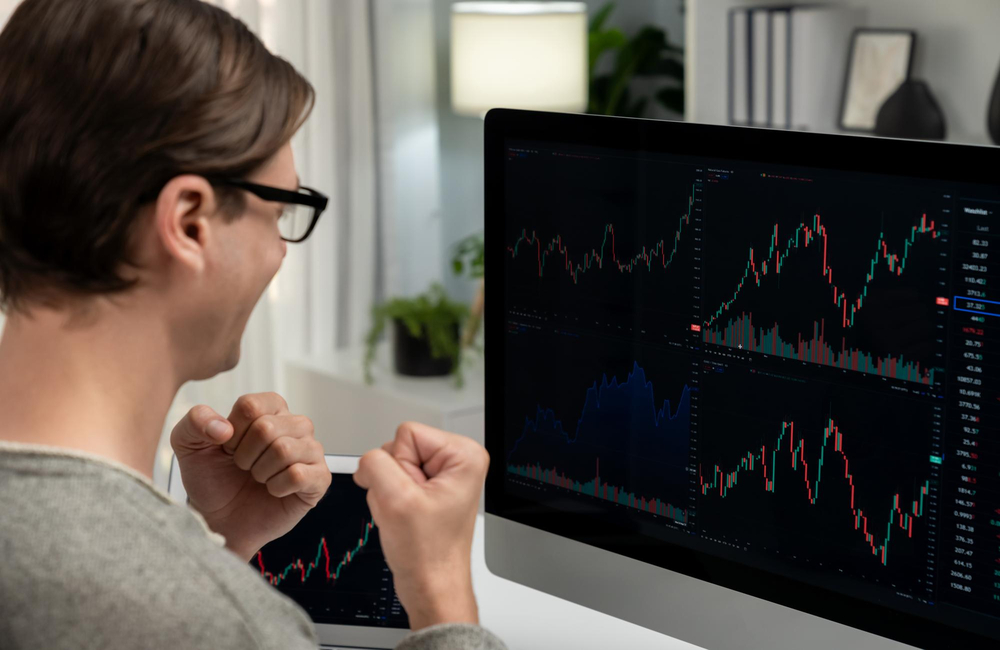It seems as though investors believe the US Fed is nearing the end of its hiking cycle.
ASX futures were 95 points or 1.4 per cent higher at 6764 at 7am AEDT on Monday, indicating a gain at the open.
Major indexes in the United States got off to a weak start on Friday then turned higher and ended the session near their highs of the day. The Dow gained 748.97 points, or 2.5 percent, to 31082.56. The S&P 500 rose 86.97 points, or 2.4 percent, to 3,752.75. The technology-heavy Nasdaq Composite climbed 244.87 points, or 2.3%, to 10859.72.
All three of the main indexes surged to weekly gains of at least 4.7 percent, a contrast to the recent bout of turbulence that has been punctuated by wild swings in stocks and bonds around the world. The Dow and S&P 500 had their best weeks since June, while the Nasdaq finished its best week since July.
Fears that the increases in interest rates will continue and push the United States into recession — are behind the sharp selloff this year.
“I think we’re in the last innings of peak Fed hawkishness,” said Christian Hoffmann, a bonds portfolio manager at Thornburg Investment Management.
On commodity markets, Brent crude oil was up 1.21 per cent to $US93.5 a barrel and gold spiked 1.8% to US$1,657.69.
In the local bond market, the yield on Australian 2 Year government bonds moved up to 3.63% and the 10 Year to 4.19%. Internationally, the 2 Year US Treasury yields rose to 4.47% and the 10 Year US Treasury yields were trading at 4.22%.
The Australian dollar fell to 63.77 US cents. The Wall Street Journal Dollar Index, which measures the U.S. currency against 16 others, inched down to 103.86.
Asia
Shares in China finished mixed, with the gains for software-service companies and the pharmaceutical sector outweighing the weakness in consumer-related sectors. Property shares jumped in the morning session after state media said Beijing will allow some companies with real-estate businesses to have more access to share financing, but trimmed gains in the afternoon. Investors are awaiting the end of the Party Congress this weekend. The Shanghai Composite Index rose 0.1% to 3038.93, but declined 1.1% for the week. The Shenzhen Composite Index fell 0.2% and the ChiNext Price Index lost 0.3%.
The Hang Seng Index lost 0.4% to 16,211.12, marking its lowest close in 13 years on lingering worries about the effects of monetary-tightening measures on global growth. Property developers recouped gains in consumer-product sectors, and losses overwhelmed gains. Shenzhou International, a supplier to Adidas, slid 9.5% after the German company reduced its full-year guidance; sportswear producer Li Ning added to losses during the previous two sessions with a 3.2% loss. Among gainers, Country Garden Holdings moved up 6.7% and Longfor Group climbed 3.5%, boosted by a state media report that said share-financing rules for some real-estate-related companies will be relaxed. For the week, the benchmark index declined 2.3 percent.
Japanese Stocks End Lower
Japanese stocks declined, pressured by weak real-estate and railway shares, on nagging worries over borrowing costs. Sumitomo Realty & Development fell 2.3% and East Japan Railway is down 2.5%. Meanwhile, Disco surged 7.9% after its 2Q net profit grew 37% to a record. The Nikkei Stock Average dropped 0.4% to 26890.58.
Europe
European stocks were mostly lower on Friday, with declines for sports-goods stocks balancing gains for financial and mining shares. The pan-European Stoxx Europe 600 dropped 0.8 percent, and the French CAC 40 was down 1 percent while the German DAX slipped 0.6 percent.
It was a slightly different story in London, where the FTSE 100 gained 0.2% as the pound dropped against the dollar and euro during UK political turmoil. In the U.K., markets were under pressure Friday as investors pondered who would win the race to become the country’s next prime minister following the resignation of Liz Truss on Thursday.
The UK situation in particular looks particularly dire and that’s before considering the fact that the Conservative party will be electing a new leader, less than two months after electing the old, Oanda analyst Craig Erlam writes. “The very idea that Boris Johnson could make a triumphant return to No. 10 tells you all you need to know about how screwed up this is.
Adidas plunges 9.5% after a profit warning, pummeling the shares of Puma and sports-goods retailers.
North America
The Dow Jones Industrial Average surged to its strongest three-week run since November 2020 as investors welcomed the appearance of a more gradual pace of interest rate hikes and digested the latest round of corporate earnings.
Major indexes began Friday in the red before rebounding and closing the session near their highs of the day. The Dow gained 748.97 points, or 2.5 percent, to 31,082.56. The S&P 500 rose 86.97 points, or 2.4 percent, to 3,752.75. The technology-heavy Nasdaq Composite gained 244.87 points, or 2.3%, to 10859.72.
All three major indexes posted weekly gains of at least 4.7 percent, a respite after several weeks of pronounced volatility, in which stocks and bonds around the world have climbed up and down. The Dow and S&P 500 ended the week with their best gains since June, and the Nasdaq notched its best gains since July.
The major indexes erased gains and Treasury yields edged off their highs as The Wall Street Journal reported that Federal Reserve policy makers are on track to raise interest rates by 0.75 percentage point at their Nov. 1-2 meeting, but are prepared to discuss switching to a less aggressive move in December.
Concerns about the speed at which interest rates are rising and whether higher interest rates are eventually going to tip the United States into a recession have brought about a steep slide all this year.
“I think we are in the final innings of peak Fed hawkishness,” said Christian Hoffmann, a portfolio manager for bonds at Thornburg Investment Management.
Investors are closely watching earnings for signs of how increasing rates, a strong dollar and high inflation are cutting into company earnings. Results for the third quarter have been somewhat of a mixed bag. US banks helped lift markets earlier this week with results that came in better than expected, but elsewhere the cracks are showing. To date the net profit margin for S&P 500 companies in the third quarter is on track to fall for the fifth straight period.
Snap shares plummeted $3.03, or 28 percent, to $7.76, after the company reported that sales growth had slowed further and indicated that the digital-ad market might be weak for a while.
"The truth is we are in weak growth, high inflation, and corporate earnings surprising to the downside. It’s a difficult mix to have,” said Luca Paolini, chief strategist at Pictet Asset Management. “This earnings season is still going to be OK. The concern is sort of for the next two, in a way.”
Twitter shares fell $2.55, or 4.9 percent, to $49.89, after Bloomberg News reported that Biden administration officials are considering whether the United States should subject some of Elon Musk’s ventures to national-security reviews.
Nonetheless, the week has been marked by a number of indications that the US economy is stronger than many had initially feared. Multiple corporate executives from JPMorgan Chase to Delta Air Lines have voiced optimism that the consumer is still healthy. And new data on Thursday confirmed that the jobs market remains firm.























